Methionine/Cysteine restriction increases longetivity AND energy expenditure
-
T3 increases FGF21 as well.
https://pubmed.ncbi.nlm.nih.gov/20236931/ -
@evan-hinkle you might be right regarding the rice diet. Rice does have protein, of course. But if the diet included plenty of fruit and sugar, and maybe coconut oil or butter, the percent of methionine could be low enough. Cronometer is reasonably helpful crunching those ratios.
Brad Marshall of fireinabottle and the old croissant diet of a couple years ago has been doing something similar, except he's focusing on the branch chain amino acids (valine, leucine, and isoleucine) instead of methionine. He's also more into starch, so he's doing casava pancakes and sweet potato rice noodles (which have zero protein and virtually no nutrients.)
OJ is an easy base for the diet because of the nutrient values (considerable in a whole gallon) but that much liquid could be a turn-off.
I've been dabbling with this idea for a couple days. It's hard for me to drink morning coffee without milk. I may go back to using cream or even coconut cream and see how it feels.
I'd love to hear anyone's experience/success trying this.
-
@Benjo - I have been leaning into a lower methionine diet for several months. I keep methionine below 1 gram/day and my cysteine is in the same ballpark. It is very doable for me. I do not obsess about getting my methionine closer to zero.
I typically get most of my calories from white rice, lentils and sweet potatoes. If you look to epidemiological studies, billions of Chinese have lived on a rice based diet for generations. The traditional Okinawan diet was based on sweet potatoes.
I am a full-grown male and I am not concerned about stunting my growth. I have an inexpensive bioimpedance scale that I purchased years ago. It montiors about 10 different things and I pay attention my muscle weight and bone weight to make sure I am doing no harm to myself.
-
I used to do juice fasting when I first tried to fix my thyroid. At the time I drank juices that had a ton of veggies in them, but you could easily swap that out for predominantly fruity juices.
If one really only needs to restrict methionine for 3 days a week, perhaps three single day juice days, (non-consecutive) a week would be another method. I always found juices very satiating, (you would think they wouldn’t be, but they are pretty dense).
I’m just trying to come up with as many example diets as possible, and hoping that you all can poke holes in them for me.
-
I'm skeptical of NAC supplementation for this reason, as well as for the fact that NAC supplementation does not raise glutathione levels except in acute cases of stark depletion
-
My diet includes about 10 grams of glycine each day. I add glycine in part to try to reduce the negative effects of glyphosate that is sprayed on our commerically produced foods. Glycine also helps with reducing the impact of methionine.
-
@Mauritio said in Methionine/Cysteine restriction increases longetivity AND energy expenditure:
Concentric exercise, in this case, treadmill uphill walk variations, increase FGF21 by 66% in 2 weeks in humans
https://pubmed.ncbi.nlm.nih.gov/22701542/Interestingly upstairs walking, a form a concentric exercise, has by far the highest calorie expenditure amongst all the sports tested.
https://x.com/T3MaxxiAlt/status/1759793246769987880
BTW if anyone finds any other ways to boost FGF22 let me know. I feel like boosting FGF22 is a better way key to get the benefits of MR without having to eat in a too restricted way.
I think methionine restriction boosts FGF22 something like 800% and I have yet to find anything else that comes even close to that . -
My diet includes a large amount of glycine. Yesterday I entered my food into cronometer.com and my methionine:glycine ratio was about 1:10. I suspect that the effect from low methionine and the effect of high glycine are additive. From 2023:
Glycine and aging: Evidence and mechanisms
Highlights
• The simple amino acid glycine extends lifespan in worms, mice, and rats.• Glycine also improves aspects of health in mammalian models of age-related disease.
• Glycine is the acceptor for GNMT, an enzyme responsible for methionine clearance.
• GNMT also converts glycine to sarcosine, an autophagy-inducing metabolite.
• Glycine may prolong life by inducing autophagy and mimicking methionine restriction.
-
@Mauritio - This 10-minute YouTube video was posted 3 days ago and it suggests ways to increase FGF21. I am thinking that they are all additive.
-
@DavidPS said in Methionine/Cysteine restriction increases longetivity AND energy expenditure:
My diet includes a large amount of glycine. Yesterday I entered my food into cronometer.com and my methionine:glycine ratio was about 1:10. I suspect that the effect from low methionine and the effect of high glycine are additive. From 2023:
Glycine and aging: Evidence and mechanisms
Highlights
• The simple amino acid glycine extends lifespan in worms, mice, and rats.• Glycine also improves aspects of health in mammalian models of age-related disease.
• Glycine is the acceptor for GNMT, an enzyme responsible for methionine clearance.
• GNMT also converts glycine to sarcosine, an autophagy-inducing metabolite.
• Glycine may prolong life by inducing autophagy and mimicking methionine restriction.
Thanks


Wasn't the increase in longevity from glycine "only" about 8%? That's quite far from MR which achieved between 30-40%. So this suggests that glycine isn't enough to mimic MR. -
@Mauritio - I apologize for the confusion. I agree that MR is superior to glycine for longevity. MR also has benefits for starving cancer.
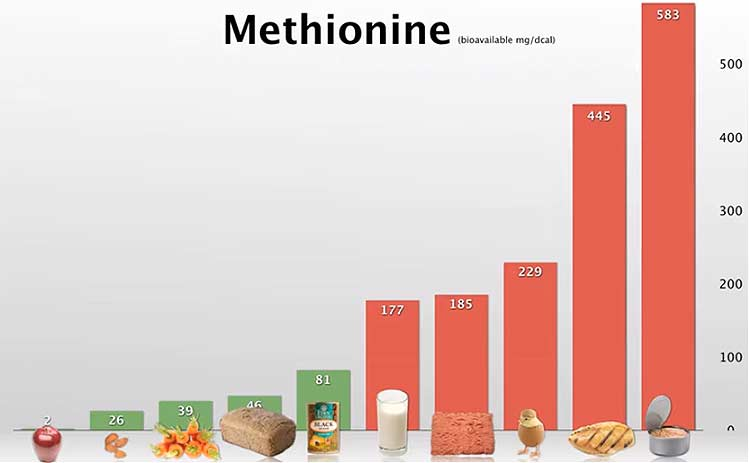
As you can see, the greatest source of methionine comes from foods of animal origin, especially chicken and fish. I am unwilling to adopt a diet based solely on plant foods and I use glycine to balance the methionine in my diet (after I have reduced it to an level that I still find appetizing).
-
@DavidPS
Sorry for the confusion as well.
The 800% increase in FGF21 was actually from the high carb diet. And as the person in the video you posted explained, they ate pasta, bread, corn and drank juices.Im going to look into that study more, mainly because it is a human study and the increase was so high.
Now compare that to the low protein study (also in humans) and they only had a 150% increase after 4 weeks.So it seems high carb is more important than low protein!
-
@Mauritio said in Methionine/Cysteine restriction increases longetivity AND energy expenditure:
@DavidPS
Sorry for the confusion as well.
The 800% increase in FGF21 was actually from the high carb diet. And as the person in the video you posted explained, they ate pasta, bread, corn and drank juices.Im going to look into that study more, mainly because it is human and the increase is so high.
Now compare that to the low protein study (also in humans) and they only had a 150% increase after 4 weeks.So it seems high carb is more important than low protein!
This is actually an excellent study. Aswers a lot of questions.
Again: high carb, seems more important than low protein. And low fat (PUFA) is important, too.
They used the following diets:
High carb: (80 E% carbohydrate, 11 E% protein, 9 E% fat)
High fat: (10 E% carbohydrate, 12 E% protein, 78 E% fat)
Control: (62 E% carbohydrates, 14 E% protein, 24 E% fat)The dfference in FGF21 between high carb and control is massive, yet the control group also ate a lot of carbs and the protein was almost the same, so the only factor that strongly differs is the fat content, which is 2,5 times higher in the control diet.
Leading me to believe that this is crucial as well: high carb AND low fat. If it was only the carbs than the control diet should have outperformed the high fat diet ,which it didn't.This underlines what Peat said for a long time that: a high carb, low/medium protein, low fat is very healthy.
I think you can go higher on protein if it is gelatin. And maybe higher on fat if it is SFA ? Im going to look into the realtionship between SFA and FGF21.Another thing we should look into is all the protein restriction animal studies.
Are they really low protein studies ? Or high carb,low protein?What is the diet of the control groups in these studies?Btw fasting is not effective in humand to boost FGF21: "...an increase in circulating FGF21 concentration is not detected until after 7–10 days of starvation in humans ..."
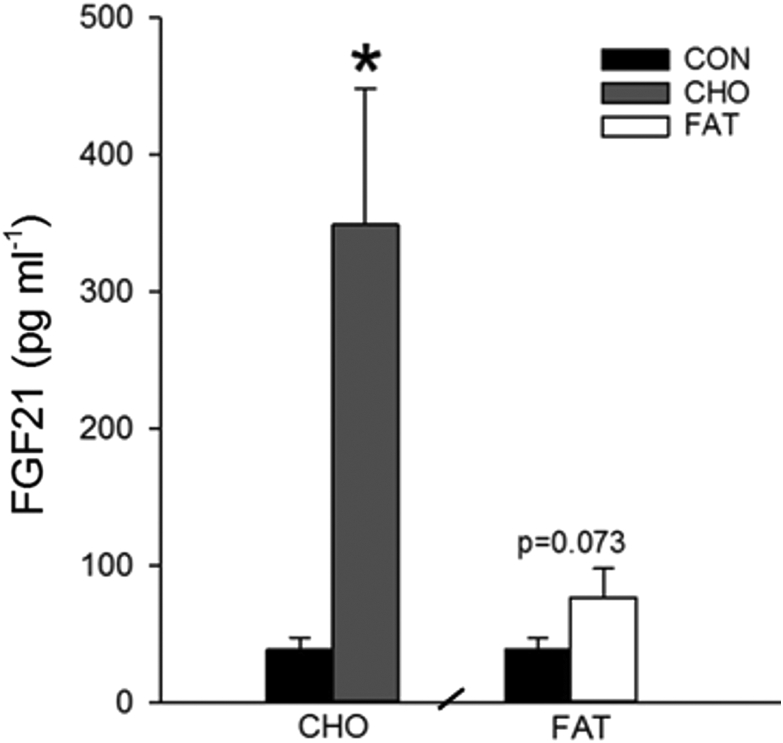
-
This study shows that the type of carbohdyrate matters: sucrose is superior to starch, in terms of FGF21.
Eventhough the 2 experimental diets have on paper the same ratio of carbs, protein and fat, they have very different outcomes. The group that had a higher sucrose ratio in their carbs had a higher metabolism, much higher UCP and FGF21, lower triglycerides, etc...
This makes the results of the above mentioned human study even more impressive, since they ate a lot of starch but managed to increase FGF21 by 800%. It probably would have been even more, if they had eaten more sucrose and less starch.
-
This study(https://pubmed.ncbi.nlm.nih.gov/25133427/#:~:text=FGF21 therefore represents an endocrine,periods of reduced protein intake.) makes the necessary diet even clearer.
In indivuduals that ate the same carbs but differing protein(and fat) contents, they showed that only the low protein group had an increase in FGF21 of about 170%So low protein, does work for increasing FGF21, but not nearly as well as high carb (and low protein). And it does work despite fat beeing at 52% of total calories. So itsnt impossible to increase FGF21 while eating high fat. I just suspect that high carb, low fat, low protein is the ideal diet for that.
Low protein,medium fat ,medium carbs: +170%
Low protein,high carb, low fat : +800% -
- You can also go too low in methionine. Going as low as 0.1% in M ,resulted in death at least in many mice
"The following year, Miller et al. (80) examined the effect of MR on longevity in postweaning female BALB/cJ × C57BL/6J F1 mice using a lower concentration of methionine (e.g., 0.1% versus 0.17%). Many mice in the MR group died of rectal prolapse, so the methionine concentration was increased to 0.12% at 4 months of age, and then again to 0.15% at 6 months of age."
- 6h hours is not a lot for a 5-fold increase! So even a short term exposure to MR should have a lot of benefits! Lets say eating most of your proteins during one time of the day. IIRC there was a study showing almost the same benefits when they only did 3 days of MR per week.
"The next important advance came with the demonstration that, within 6 h of initial exposure to the MR diet, hepatic expression and circulating levels of FGF21 were increased fivefold in mice consuming the MR diet (118, 130). "
- As Peat said cysteine is also to be restricted!
"A second line of evidence comes from studies showing that adding back small amounts of cysteine to the MR diet reversed the diet’s induction of hepatic FGF21 but did not abrogate the ability of the MR diet to downregulate lipogenic genes in the liver (130)."
"The addition of 0.2% cysteine completely reversed the ability of the 0.17% methionine diet to increase EE and reduce fat mass (130)."
- The concentrations of methionine and cysteine have to be dialed in pretty wel, to achieve the desired effect.
Although in the human studies they mostly didst control for methionine content AFAIK, but only protein content, which was always around 10%, so that seesm to be enough to get at least some of the effects of the animal studies.
"Methionine concentrations above 0.25% produce very little response, concentrations between 0.12% and 0.25% are ideal for improving metabolic biomarkers, and concentrations below 0.12% represent deprivation and will not sustain life. Concentrations of methionine between 0.15% and 0.20% seem to provide the best combination of reduced adiposity without significant weight loss (Figure 4). "
-
Intermittent protein restriction might be a thing and reversed diabetes progression in this study.
They had one group that ate: 3 days low protein, followed by 4 days of a normal diet. And one group that ate 3 days low ,followed by 2 days high, followed by 2 days of normal protein. I think the most effective low protein concentration was 5%.
In terms of effects the 3-2-2 diet was slighlty superior the 3-4 diet. So a high protein window does not "ruin" the benefits of the previous low protein window.This image is interesting since it shows that even a single day of a low protein diet per week might be beneficial. But the more days the better ( at least up until 3 days/w, they didnt test for more)
In image (b) you can see that the 3-4 and the 3-2-2 diet resulted in about a 10-fold increase in FGF21 after 13 weeks. That is the biggest increase I have seen so far.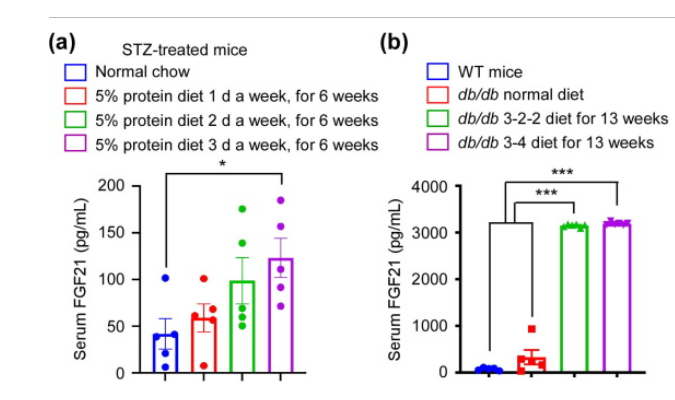
They looked at continous protein restriction and while that caused weight loss and was good for diabetes it seemed to cause liver abnormalities (high triglycerides, high liver enzymes,...), so that is weird. Maybe 5% was too low continously?
https://www.sciencedirect.com/science/article/pii/S2095927321008033?via%3Dihub
-
This is interesting research, I'm glad it's being discussed here. Anecdotally, when I was doing protein restriction a couple years ago I actually felt very good while doing it, and I wasn't even on thyroid during this period. I came to the conclusion that the "low-protein" aspect was more beneficial than the "low-fat" aspect of it. Though I'd imagine they both synergistically aid to some extent.
What set me on that path was stumbling upon some studies that suggested low-protein diets can reduce CRH and ACTH output, and thus quiet that negative feedback loop of stress hormones. I couldn't go long without eating because my liver was malfunctioning and not holding glycogen well.
The low protein diet seemed to stop (or slow down) the gluconeogenesis and subsequent stress response, as I wouldn't get the low blood-sugar "shakes" anymore, however I ran into a new problem of never seeming to get full. I was basically always thinking about food, even after eating. I guess because a almost pure carbohydrate diet doesn't really hit that satiety factor as much as a higher protein diet does, idk.
After successfully implementing thyroid into my regime I can handle higher protein much better, but I do believe a low-protein diet can partially alleviate many of the main issues associate with hypothyroidism if you can stick to it. I'm not really interested in going full low-protein again, but it would be nice to find a complete list of all the high methionine foods, because avoiding methionine and cysteine would be something I'd do, along with tryptophan.
-
According to the study below, avoiding continuous dieting may be the key to losing weight and keeping it off, say nutrition scientists, but traditional intermittent fasting regimens such as the popular 5:2 diet are not the way to do it.
The findings from a randomized controlled trial, including 51 obese men, show that taking a two-week break from energy restriction appears to be critical to success. Those who take a break from dieting lose on average 47% more weightthan the continuous dieters and 80% more weight at six-month follow-up.
In the current study, intermittent dieters achieve “superior weight loss”, the researchers say. Two groups of participants took part in the 16-week trial, which cutcalorie intake by one-third. One group maintained the diet continuously while the other dieted for two weeks and then stopped for two weeks, eating simply to keep their weight stable, andrepeated this cycle for 30 weeks to ensure 16 weeks of dieting. The researchers report that those in the intermittent diet group not only lost more weight, but also gained less weight after the trial finished. “Although both groups regained weight post-intervention,weight loss (reduction from baseline) was on average 8.1kg greater inthe intermittent group than the continuous group at six-monthfollow-up,”
Intermittent energy restriction improves weight loss efficiency in obese men: the MATADOR study
The MATADOR (Minimising Adaptive Thermogenesis And Deactivating Obesity Rebound) study examined whether intermittent energy restriction (ER) improved weight loss efficiency compared with continuous ER and, if so, whether intermittent ER attenuated compensatory responses associated with ER.
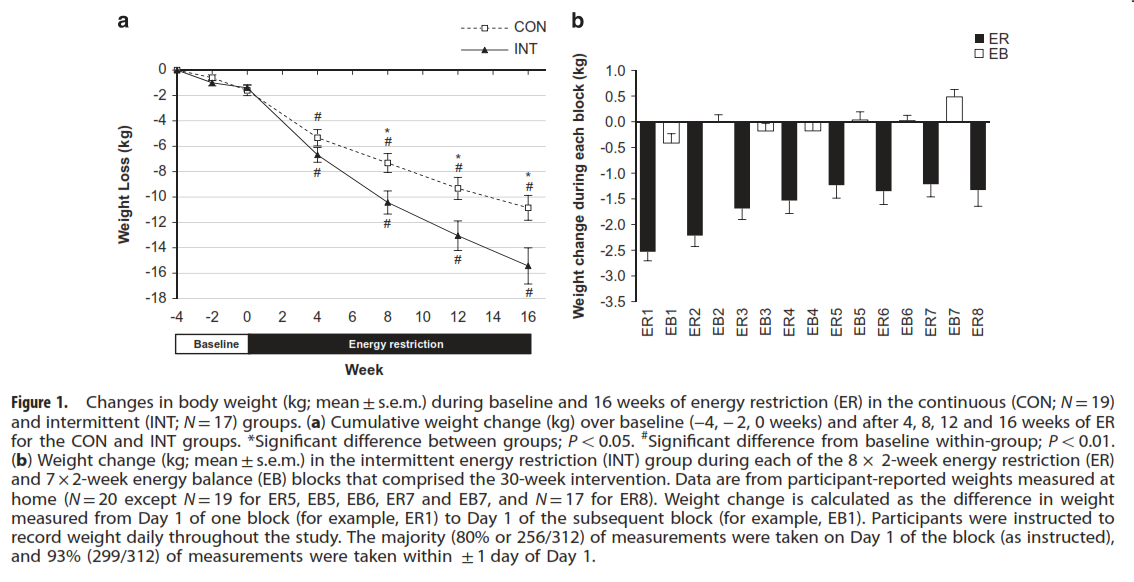
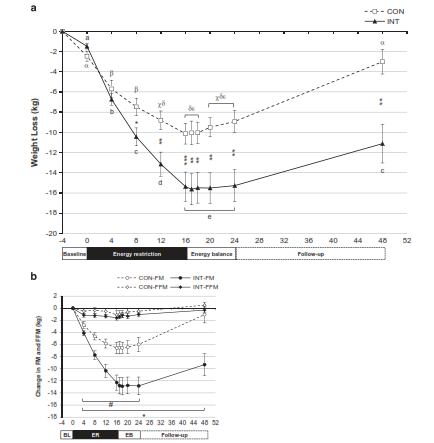
-
@Mulloch94 said in Methionine/Cysteine restriction increases longetivity AND energy expenditure:
This is interesting research, I'm glad it's being discussed here. Anecdotally, when I was doing protein restriction a couple years ago I actually felt very good while doing it, and I wasn't even on thyroid during this period. I came to the conclusion that the "low-protein" aspect was more beneficial than the "low-fat" aspect of it. Though I'd imagine they both synergistically aid to some extent.
What set me on that path was stumbling upon some studies that suggested low-protein diets can reduce CRH and ACTH output, and thus quiet that negative feedback loop of stress hormones. I couldn't go long without eating because my liver was malfunctioning and not holding glycogen well.
The low protein diet seemed to stop (or slow down) the gluconeogenesis and subsequent stress response, as I wouldn't get the low blood-sugar "shakes" anymore, however I ran into a new problem of never seeming to get full. I was basically always thinking about food, even after eating. I guess because a almost pure carbohydrate diet doesn't really hit that satiety factor as much as a higher protein diet does, idk.
After successfully implementing thyroid into my regime I can handle higher protein much better, but I do believe a low-protein diet can partially alleviate many of the main issues associate with hypothyroidism if you can stick to it. I'm not really interested in going full low-protein again, but it would be nice to find a complete list of all the high methionine foods, because avoiding methionine and cysteine would be something I'd do, along with tryptophan.
If you dont want to go full low protein, maybe just 2 days a week is doable. If you look at image (a) in the post above, you can see that even 2 days a week at 5% protein caused FGF21 to more than double. And 5% might not even be necessary in rat and the human studies they mostly used 10% which is about 50-75g of protein for most people. Although that sounds more than it is.
How much protein and fat did you eat during those days?